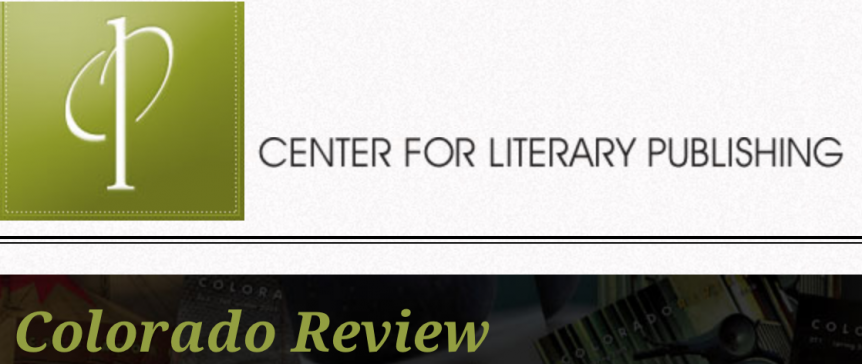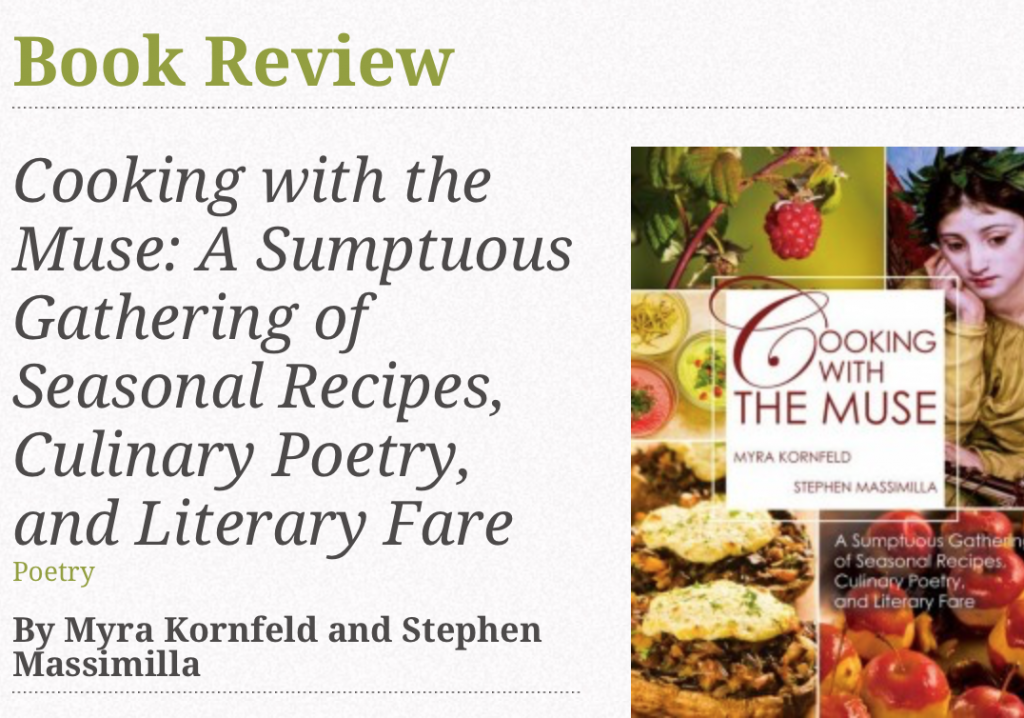To read the original review, CLICK HERE
I adore the statement by Elisabeth Prueitt, chef, cookbook author and co-owner of Tartine Bakery in San Francisco, that “cookbooks are the novels of choice for working parents.” It’s true. Whether you are a parent or not, we all have busy lives in which our time to cook—let alone read—is limited. Yet, I believe cookbooks can be pleasurable respites and inspiring tools to help you actually feel as if you have more time in your day. No better place to look than the dense book lover’s cookbook, Cooking with the Muse: A Sumptuous Gathering of Seasonal Recipes, Culinary Poetry, and Literary Fare by Myra Kornfeld and Stephen Massimilla, for pure delectable inspiration. Far more than a cookbook offering quick and tasty meals, this wonderfully curated and carefully organized resource is a delightfully poetic read.
Cooking with the Muse has a lofty claim, to elucidate how poetic inspiration has influenced our daily lives through the harvesting and making of food. From a gourmet’s palate with cultured tastes to the humble maker of breakfast toast with jam, the muse arouses our desire to eat well. Despite this esoteric premise, Cooking with the Muse delivers and then some. This helpful cookbook informs, educates, and truly inspires its readers not only to want to cook, but to cook well. With over five hundred pages; more than one hundred and fifty well-tested recipes; stunning, crisp photography; very clearly illustrated instructional culinary how-tos, tips, and techniques; seasonally organized recipes thoughtfully paired with poems; and—my personal favorite—scholarly essays on poems; Cooking with the Muse imparts a lot. This cookbook is a poetic and culinary source to which I will return for both cooking purposes and reading pleasure.
What makes Cooking with the Muse so enjoyable and different from many cookbooks today is that few take on the task of being so inspirational. Too often cookbooks narrow their focus on cooking for specific diets or dietary restrictions instead of showing how cooking—and poetry for that matter—can be enjoyable and relevant daily. Perhaps we’ve lost a sense of daily food celebration by focusing on results instead of process. As a chef and poet, I really enjoyed Cooking with the Muse for the thorough instructions along with very clear illustrations, like how to properly cut an onion depending upon desired cooking purpose. The wonderfully rich sections titled “Poet’s Note” give cultural, historical, literary, and—of course—poetic references for ingredients from kale to coffee. I found myself wanting to write a poem as much as I wanted to cook after reading this book.
Yet, like a well-crafted poem read again and again, it is the tone of Cooking with the Muse which really inspired me. I moved happily and with ease from recipe to literary history while enjoying the greater depths a recipe holds. Kornfeld and Massimilla want to be as thorough as possible with each recipe, including cultural and historical context along with poetic relevance for even the simplest of recipes, such as the aromatic and complex flavors found in a cup of dirty chai. Welcoming and warm, this book’s attention to detail—from how to source potentially hard-to-find ingredients to alternatives due to allergies and food sensitivities—really appeals to a wider audience. This book welcomes the potential off-the-couch cook as well as someone who enjoys reading rather than writing poetry, no matter if you are a literary scholar or a professional chef. You will want to read and reread Cooking with the Muse in a manner similar to that in which you’d want to cook a fine bowl of soup, for the comfort and emotional experience.
Many cookbooks include a narrative, which is usually driven by the history, personality, and travels of the chef as author. Cooking with the Muse is creating something more difficult than narrative. Where do we find inspiration? How can we find space and time for the muse in our busy lives, at the table or in our hearts? Kornfeld and Massimilla answer that we return to the humble food of our beginnings. We return to the seasons of harvest, cold storage, bud, blossom and bloom, and then the indelible summer fruits. We return to what might have inspired the young sheepherder to try the curdled milk he found in a cave in southern France which, delightfully, we know today as Roquefort. We return to discovery and welcome the curiosity driven by our hunger to learn more. Cooking with the Muse reinforces this quest.
Kornfeld and Massimilla attempt to offer a lot, yet really deliver. Cooking with the Musewill inspire you to cook a meal for your loved ones as well as to learn more about the bond between poetry and culinary history. You will want to have this book by your nightstand, perhaps not for the narrative quality of a story as much as to feel transported. And in the end, that is what loaves of homemade bread and coveted poems can do—transport us to another time and emotional space. Food preparation, like the process of writing a poem, can be a way of slowing us down. To make a meal with our own hands, and to write a line of a poem we feel before jotting it down, are magic. I’m grateful this book attempts to take its readers on such an experience, to a place where everyone gets a seat at the table and we can all eat and read well.
Emily Walter lives, writes, and cooks in Missoula, Montana, where she has run a cooking school and taught poetry workshops and classes along with recently writing her favorite poem she’s probably ever going to write—Nina, her daughter.

